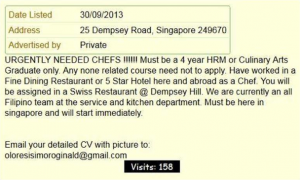Roginald Santos Oloresisimo is no longer in Singapore. He boarded a plane bound for the Philippines this morning. It is unclear if he is coming back or if he still has his old job. What is obvious though is that the last few weeks must have been highly stressful for him.
Roginald probably never saw it coming – the anger, the backlash, the petition demanding that he be punished. His transgression? Posting an advertisement on behalf of a restaurant where he had worked as a chef.
This is what it said:
Why did Roginald feel compelled to highlight in the ad that this person would be joining an “all Filipino team”? Did his company vet the post before it went out? Why was the “team” made up only of people from one country? Is the ad discriminatory?
Some Singaporeans clearly think so. An angry post on the matter quickly went viral. Roginald’s employers issued an apology and distanced themselves from his actions. Evidence that the chef had placed a separate advertisement earlier in September, for a “Filipino female”, caused even more outrage. A petition calling for the withdrawal of his work permit was circulated online. It drew more than a thousand signatures and triggered a heated debate about racism, xenophobia and discrimination. The exchanges haven’t stopped. Roginald, meanwhile, has left the country.
*
It’s hard not to feel the squeeze in Singapore – not when our trains are packed, our roads increasingly congested, our shops and restaurants staffed by an ever-growing number of foreigners. Where do we stand in our own country? Is there still a place for us? How can Singaporeans – with massive housing loans and family obligations – compete with eager foreigners, willing to work for a fraction of what we are able to accept?
These are valid questions, important ones that our leaders need to answer – not with platitudes and empty promises, but with concrete actions. People are falling through the cracks. Families are living in vans and parks. Homelessness is no longer invisible in this land of plenty. Singaporeans are struggling, not because they are lazy, but because many find it increasingly difficult to survive in a system that reduces workers to units of labour, a system that celebrates “cheaper, faster, better”.
But the Singaporean worker isn’t the only one suffering. Go to the soup kitchen run by migrant rights group Transient Workers Count Too and you’re likely to meet an endless stream of men from countries like India, Bangladesh and Sri Lanka, all with horror stories to tell. Employment scams, unpaid wages, physical abuse, injuries and poor living conditions – it’s mind boggling, what some people have to put up with, simply for the privilege of working in Singapore.
How does the ordinary person compete in a system that condones exploitation? Something is broken. Some policies are not working. Something needs to be done. Blaming foreign workers like Roginald is not the answer.
We do not know what the chef was thinking when he posted the advertisement. Perhaps he was just following orders. After all, he could not have been solely responsible (if at all) for the “all Filipino team” at the restaurant. Who made that hiring decision?
Maybe Roginald thought the job wouldn’t appeal to Singaporeans. Or maybe he wanted to give his fellow Filipinos a leg-up. Help his own people. Do them a favour. He’s yet to speak up, so no one knows. But that’s not stopped many of us from judging.
Should Roginald be reprimanded? Of course. Does he deserve to have his work permit taken away? I think not. Why take our frustrations out on him? He is not responsible for our loose immigration policy, or for the pain caused by poor planning on the part of our leaders.
Roginald came to Singapore because he saw opportunities here – a chance to build a better life. He probably has family to support, mouths to feed. His mistake was ostensibly, that of showing favouritism towards his fellow citizens. Is this a transgression so extreme that we must insist he lose his livelihood?
We let the real culprits off the hook when we demand that a lowly worker bear the brunt of our rage. I hope Roginald learns his lesson, but I also hope he gets to keep his job. For we undermine our own calls for justice, equality and fairness when we insist on a disproportionately harsh punishment for someone like him. Yes, we are stressed out and frustrated. But we are also better people than this.


